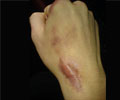Most studies on skin ulcer treatment are so technically flawed that their results are unreliable, a systematic review of 66 research papers has found.

The research review team, led by investigators at the Johns Hopkins Evidence-Based Practice Center and the Johns Hopkins Wound Healing Center, noted than an estimated $25 billion is spent annually in the United States treating chronic skin wounds related mostly to poor blood circulation, disorders known as venous ulcers. Their prevalence is rising along with rates of diabetes and obesity, and the review was undertaken in an effort to inform physicians about the treatment options.
In 2011, the Agency for Healthcare Research and Quality awarded the Johns Hopkins Evidence-Based Practice Center a $475,000 project to carry out the research, which was led by Gerald Lazarus, M.D., founder of the Johns Hopkins Wound Healing Center and professor of dermatology and medicine at Johns Hopkins Bayview Medical Center; and Jonathan Zenilman, M.D., scientific director of the Wound Healing Center and professor of medicine and chief of the Division of Infectious Diseases at Johns Hopkins Bayview.
The research review team began by identifying 10,066 citations that were possibly related to wound care. They found that only 66 of these papers specifically addressed their questions about the effectiveness of treatments for chronic venous leg ulcers.
For the study, the investigators analyzed clinical outcomes involving wound dressings, antibiotics and venous surgery.
Overall results found that dressings that used living human cells increased wound healing. Results suggested that cadexomer iodine and collagen may also increase healing, says Lazarus. "That doesn't mean that other types of dressings don't work. It just means that there is no evidence yet on which treatments work the best," says Lazarus. Support stockings, he adds, must for now remain the standard of care for treating chronic venous ulcers.
Advertisement
"There is a critical need for well-designed research studies to compare the current minimally invasive surgical interventions to the gold standard of care, compression therapy," he says.
Advertisement
Chronic wounds are a global problem, the researchers say. In addition to obesity and diabetes worldwide, skin ulcers occur as a consequence of neurological problems, rheumatological illnesses, blood vessel inflammation and infection. Nonhealing wounds cause not only pain, but also loss of mobility and a general decline in physical and emotional well-being. Patients can become disabled, unable to work and dependent on care from others.
Lazarus says, "The review should serve as a means to bring the wound healing community together to improve the situation." Christine Chang, M.D., M.P.H., medical officer of the Center for Outcomes and Evidence at the Agency for Healthcare Research and Quality, adds, "Our hope is that this evidence report provides patients and providers with the best information available to make well-informed decisions about care."
Source-Eurekalert










